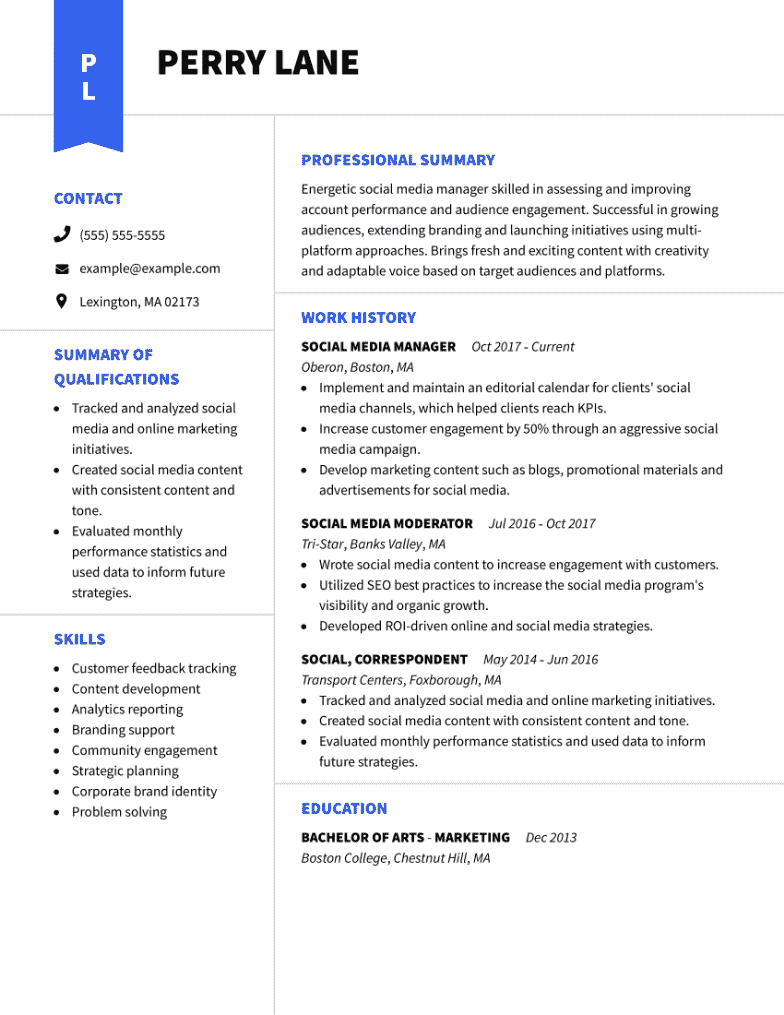We personalize your experience.
We use cookies in our website to ensure we give you the best experience, get to know our users and deliver better marketing. For this purpose, we may share the information collected with third parties. By clicking “Allow cookies” you give us your consent to use all cookies. If you prefer to manage your cookies click on the “Manage cookies” link below.
Write an effective social media resume using our trusted tips, social media resume examples and resume builder tool.
Our customers have been hired by*:*Foot Note

Show hiring managers you can coordinate your social media resume just as well as you can coordinate social media, using this resume sample as a guide.

As a social media whiz, marketing other people’s products and services should come naturally—but how well can you market yourself to a potential employer? The resume is your first opportunity to showcase your skills in social content creation and convince the hiring manager to offer you an interview.
This guide will show you:
The recruiter will want to hear about your experience managing social media campaigns, creating killer strategies, and building online communities across different social media platforms. This doesn’t have to be in the form of a paid position. Voluntary and intern experience can suffice for entry-level roles.
Draw attention to your areas of expertise within social media management. This could be market research, strategic planning, public relations, brand awareness, community management or a combination of these areas. In addition, mention any relevant software tools you are competent with.
The structure of your social media resume will vary depending on your chosen resume format. There are three options:
No matter what structure you use, your resume will contain these sections:
The resume header contains your contact details. In this section, include your full name, phone number, professional email address, and LinkedIn profile link. You may also add a link to an online portfolio, if available. Present this information clearly so the recruiter can contact you easily.
Provide a brief overview of your profile as a candidate. There are two ways to do this:
The resume summary is best if you already have several years of experience working with social media content. You can use the resume objective if you’re at the starting point in your career and prefer to emphasize your skills.
Use the skills section to profile your abilities as a social media specialist. Tailor your resume to the role by including some of the desirable skills listed in the job description.
While soft skills are important, it’s best to focus on role-specific hard skills given the technical nature of social media management. Some hard skills you might mention are:
You can also list software you are competent with, including:
In the work experience section, run through your previous jobs (up to the last 10 years) in reverse chronological order, starting with your current or most recent job. For each position, list tasks or accomplishments that are especially relevant to the social media manager job you’re applying to, in bullet points.
Use specific examples and quantifiable metrics to add context to your achievements. With your most successful marketing campaign, for example, you could mention how many impressions it made or by how much it increased traffic to the company website.
If you lack hands-on experience working with social media accounts, you can discuss digital marketing experience to demonstrate transferable skills. Key principles like market research, brand awareness, and data analytics still apply to social marketing.
The education section is an important part of your professional resume. Include your bachelor’s degree and any relevant certifications. If you don’t have much experience, training programs from established providers like Google Analytics Academy will show your willingness to learn.
Have questions? We’re here to help.
Unless the job posting says not to, always include a cover letter with your application. The cover letter allows you to give further details about your key skills and experiences. It’s also a great way to show employers how you fit the needs of the role.
If you lack professional experience, you can still write a strong resume by focusing on any extracurricular experiences as a volunteer or intern. Certifications are another good way to show your abilities and can be included in the education section. Finally, include some of the desirable skills mentioned in the job description in your skills section.
Always tailor your resume to each new role you apply to. If you’re applying to a social media marketing agency, for example, you’ll need to show you can work across a variety of social media accounts. As an in-house social media marketer, on the other hand, you should highlight your ability to work with brands and build an online community over time.
Couldn't find the answer you're looking for?